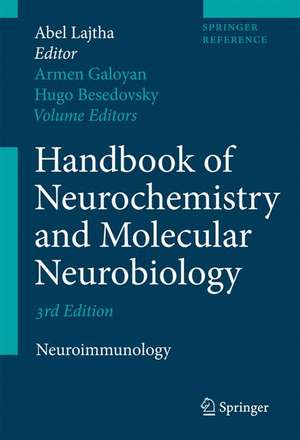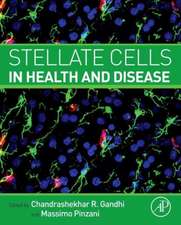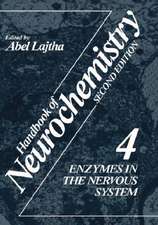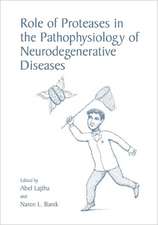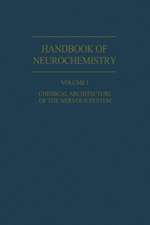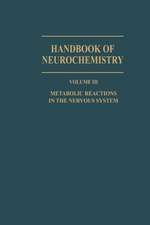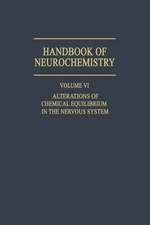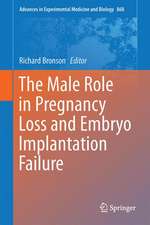Handbook of Neurochemistry and Molecular Neurobiology: Neuroimmunology
Abel Lajtha Editat de Armen Galoyan, Hugo Besedovskyen Limba Engleză Hardback – 13 dec 2007
Preț: 1239.19 lei
Preț vechi: 1511.20 lei
-18% Nou
Puncte Express: 1859
Preț estimativ în valută:
237.13€ • 253.56$ • 197.71£
237.13€ • 253.56$ • 197.71£
Carte tipărită la comandă
Livrare economică 17 aprilie-01 mai
Preluare comenzi: 021 569.72.76
Specificații
ISBN-13: 9780387303581
ISBN-10: 0387303588
Pagini: 495
Ilustrații: XIII, 495 p.
Dimensiuni: 170 x 244 x 25 mm
Greutate: 1.06 kg
Ediția:3rd ed. 2008
Editura: Springer Us
Colecția Springer
Locul publicării:New York, NY, United States
ISBN-10: 0387303588
Pagini: 495
Ilustrații: XIII, 495 p.
Dimensiuni: 170 x 244 x 25 mm
Greutate: 1.06 kg
Ediția:3rd ed. 2008
Editura: Springer Us
Colecția Springer
Locul publicării:New York, NY, United States
Public țintă
ResearchDescriere
Neuroimmunology is one of the most rapidly developing branches of Neurobiology, prompted by novel neurochemical, neuroendocrinological and neurophysiological investigations of the central and peripheral nervous system including neuro-endocrine systems. Neuroimmunology can be considered an interdisciplinary science that covers relevant aspects of how the peripheral immune system can influence brain physiology and elicit neuro-endocrine immuno-regulatory responses and also how local interactions between immune and neuronal mediators of the brain influence the occurrence and course of neuropathologic diseases. That explains the reason why we have in this volume chapters that focus on immune-neuro-endocrine interactions underlying the control and regulation of processes involved in both immune and brain physiology and in the pathogenesis of different nervous diseases. Among such diseases are: schizophrenia, HIV, associated dementia, rheumatoid arthritis, several experimental pathologies, multiple sclerosis, autoimmune encephalomyelitis, Theilers virus infection, nervous system demyelination diseases, the primary degenerative disorders such as Alzheimer’s and Parkinson’s as well as brain injuries resulting from stroke and trauma, the neuroimmunology of gene therapy, amyotrophic lateral sclerosis, prion disease and all theoretical questions covering these pathologies. All of the above mentioned involve autoimmune processes.
It is difficult, indeed, to imagine fundamental neurobiological processes, autoimmune, neuroendocrine and infectious diseases, where immune factors are not of prime importance. The elucidation of the intimate molecular-biological problems of immunopathologies requires deep knowledge of the intricate connection between immunomodulators, immune competent cells of blood, brain, and other organs.
This volume contains data on multiple immunomodulators, many of which are also the products of hypothalamic brain cell neurosecretion. Interleukins (IL-1a, IL-1ß, IL-2, IL-4, IL-6, TNFa), immunophylin and ubiquitin as well as proline rich peptides, comprised of 10-15 amino acids are being produced in N. Supraopticus and N. Paraventricularis and then secreted into neurohypophysis. Along the neurosecretion of the mentioned cytokines, there are other immunomodulators, the primary structure of which had been completely deciphered such as: Immunophyllins, intracellular receptors of immunosuppressors FK506, cyclosporine A., rapamicin. They are peptidyl-prolyl-cis-trans-isomerases. There are novel immunological hypothalamic factors such as ubiquitin, macrophage migration inhibitory factor (MIF), as well as Thymosin ß 4(1-39). This data allowed us to propose the concept of neuroendocrine immune system of the brain.
It is difficult, indeed, to imagine fundamental neurobiological processes, autoimmune, neuroendocrine and infectious diseases, where immune factors are not of prime importance. The elucidation of the intimate molecular-biological problems of immunopathologies requires deep knowledge of the intricate connection between immunomodulators, immune competent cells of blood, brain, and other organs.
This volume contains data on multiple immunomodulators, many of which are also the products of hypothalamic brain cell neurosecretion. Interleukins (IL-1a, IL-1ß, IL-2, IL-4, IL-6, TNFa), immunophylin and ubiquitin as well as proline rich peptides, comprised of 10-15 amino acids are being produced in N. Supraopticus and N. Paraventricularis and then secreted into neurohypophysis. Along the neurosecretion of the mentioned cytokines, there are other immunomodulators, the primary structure of which had been completely deciphered such as: Immunophyllins, intracellular receptors of immunosuppressors FK506, cyclosporine A., rapamicin. They are peptidyl-prolyl-cis-trans-isomerases. There are novel immunological hypothalamic factors such as ubiquitin, macrophage migration inhibitory factor (MIF), as well as Thymosin ß 4(1-39). This data allowed us to propose the concept of neuroendocrine immune system of the brain.
Cuprins
BRAIN CYTOKINES AS INTEGRATORS OF THE IMMUNE-NEUROENDOCRINE NETWORK – H. O. Besedovsky and A. del Rey.- NEUROPEPTIDES IN THE IMMUNE SYSTEM: MEDIATORS OF STRESS AND INFLAMMATION – D.S. Jessop.- EFFECTS OF THE IMMUNE SYSTEM ON BRAIN NEUROCHEMISTRY – A. J. Dunn.- AGE-RELATED ALTERATIONS IN AUTONOMIC NERVOUS SYSTEM INNERVATION OF LYMPHOID TISSUE – D. L. Bellinger, C. L. Lubahn, A. B. Millar, J. L. Carter, S. Vyas, S. D. Perez, and D. Lorton.- DRUGS THAT TARGET SYMPATHETIC-IMMUNE PATHWAYS FOR TREATMENT OF AUTOIMMUNE DISEASES – D. Lorton, C. Lubahn, and D. Bellinger.- NEURO-IMMUNE ASSOCIATIVE LEARNING – M.-B. Niemi, G. Pacheco-López, H. Engler, C. Riether, R. Doenlen, and M. Schedlowski.- THE BRAIN IMMUNE SYSTEM: CHEMISTRY AND BIOLOGY OF SIGNAL MOLECULES – A. Galoyan.- THE DIALECT OF IMMUNE SYSTEM IN THE CNS: THE NERVOUS TISSUE AS IMMUNE COMPARTMENT FOR T CELLS AND DENDRITIC CELLS – Z. Fabry, E. Reinke, A. Zozulya, M. Sandor, and I. Bechmann.- IMMUNOPROTEASOME ACTIVITY IN THE NERVOUS SYSTEM – M. T. Rinaudo and M. Piccinini.- REGULATION OF THE INFLAMMATORY RESPONSE IN BRAIN – W. Stenzel and G. Alber.- EVOLUTIONARY ORIGINS OF THE BRAIN'S IMMUNE PRIVILEGE. IMPLICATIONS FOR NOVEL THERAPEUTIC APPROACHES: GENE THERAPY – P. R. Lowenstein, K. Kroeger, C. Barcia, J. Zirger, D. Larocque, and M. G. Castro.- ADENOSINE: AN ENDOGENOUS REGULATOR OF THE BRAIN IMMUNE SYSTEM – G. Haskó and E. S. Vizi.- NEUROIMMUNE CROSS TALK – G. Juhász.- ROLE OF GLIA IN CNS INFLAMMATION – S. Pawate and N. R. Bhat.- AUTOIMMUNE PROCESSES IN THE CENTRAL NERVOUS SYSTEM – C. J. Welsh and C. R. Young.- EXPERIMENTAL AUTOIMMUNE ENCEPHALOMYELITIS – B. Gran, K. O’Brian, D. Fitzgerald, and A. Rostami.- IMMUNOLOGICAL ASPECTS OF CENTRAL NERVOUS SYSTEM DEMYELINATION – S. Pawate and S. Sriram.- THE INFLAMMATORY COMPONENT OF NEURODEGENERATIVE DISEASES – C. C. Ferrari and F. J. Pitossi.- MECHANISMS OF INFLAMMATION IN HIV-ASSOCIATED DEMENTIA – B. Giunta, F. Fernandez, and J. Tan.- ROLE OF POLY(ADP-RIBOSE) POLYMERASE IN BRAIN INFLAMMATION AND NEUROINJURY – G. S. Scott, K. Komjáti, V. C. Besson, and C. Szabó.- SCHIZOPHRENIA AND IMMUNE RESPONSES – F. Gaughran, J. Welch
Recenzii
From the reviews of the third edition:
"A new edition of the Handbook of Neurochemistry and Molecular Neurobiology has now been issued in 25 volumes. It contains fundamental data on current molecular neurobiology, neuroimmunology, and neuropathology. This is the first time that the series contain Neuroimmunology, which summarizes achievements in neurochemistry, neuroendocrinology, neurophysiology, and the pathology of the nervous system. … This book presents research performed by scientists in various countries. … a handbook for scientists, students, and clinicians." (K. G. Gevorgyan, Neurochemical Journal, Vol. 3 (1), 2009)
"A new edition of the Handbook of Neurochemistry and Molecular Neurobiology has now been issued in 25 volumes. It contains fundamental data on current molecular neurobiology, neuroimmunology, and neuropathology. This is the first time that the series contain Neuroimmunology, which summarizes achievements in neurochemistry, neuroendocrinology, neurophysiology, and the pathology of the nervous system. … This book presents research performed by scientists in various countries. … a handbook for scientists, students, and clinicians." (K. G. Gevorgyan, Neurochemical Journal, Vol. 3 (1), 2009)
Caracteristici
Contains essential data on multiple immunomodulators
Third edition with fresh material and corrections
A key text in a rapidly advancing field
Third edition with fresh material and corrections
A key text in a rapidly advancing field
